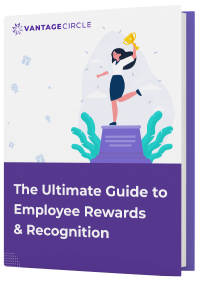Impact of Rewards and Recognition On Mental Health

The past year hasn't been easy on anybody, even more so for the employees.
In addition to worrying about the pandemic and the isolation bought on by it, people with jobs had additional concerns about their job insecurity.
Do you know the one thing that is worse than losing your job? It's losing your job during a pandemic.
With many businesses around the globe being forced to lay off most of their workers, such fears of being laid off are understandable.
If you, as a leader or manager, have noticed a significant drop in productivity and efficiency among your employees, it's possibly due to the tension, anxiety, and alienation brought on by the current global tensions.
According to new research from Ohio State University, these challenges have affected people's engagement at work and shown drastic consequences for workers' mental health and wellness.
As a response, companies must find newer, stronger, and more reliable ways to engage their employees while maintaining a positive employee experience. Let’s have a look at how.
The Impact Of Rewards And Recognition In Today’s Corporate World

Human beings are social creatures.
A majority of the actions we perform are tied to our need to be acknowledged and appreciated for the efforts we put in. And your employees are no different.
When people feel engaged, it shows.
Be it in the business results, enhanced company culture, heightened productivity levels, or through employee advocacy.
Even if the pandemic never happened, your workers would gradually become disengaged if the company does not show that they are valued.
Although the term “employee engagement” might seem inconclusive, it’s really about doing things that will make an employee feel happy, satisfied, and safe at their place of work.
While making an employee feel so will require time, patience, and resources, a large part of engaging employees lies in following the right rewards and recognition practice.
Rewards and recognition have been at the top of the priority list for multiple businesses. Out there, there is a talent battle happening on a large scale.
Leaders must create a corporate culture where employee appreciation is the norm not only to attract the top talents but also to retain them in the long run.
Let's take a look at the eight most distinct advantages of rewards and recognition in the workplace:
- Enhances company culture
- Provides a competitive advantage
- Improves employee-employer relationships
- Boosts team spirit
- Empowers employees
- Promotes better employee retention
- Establishes strong brand value
- Enhances holistic employee well-being
The Growing Importance Of Mental Health At The Workplace

It's not uncommon that leaders often forget a critical element of overall well-being in their haste to achieve peak physical health in employees—mental wellness.
Organizational leaders are so focused on promoting good physical health that they neglect to acknowledge the effects of ignoring mental health in the workplace.
Did you know that almost 1 out of 6 people experiences some form of mental health problems in the workplace?
Do you know where we went wrong?
Commonly, a strong distinction is made between the "mind" and the "body." And it is at this point that we begin to make bad decisions.
Having a “healthy mind” and “healthy body” shouldn't be considered two separate entities.
It’s not about comparing apples to oranges here. You don't have to choose one above the other. For a person to perform at their optimal level, mental health is as necessary as physical health.
With 2021 being the year where health is prioritized, companies need to ensure that mental well-being is not disregarded.
The impact of the pandemic on our mental well-being had been brutal. In January 2021, 41% of adults reported symptoms of anxiety and/or depressive disorder.
According to CDC, stress and anxiety, coupled with isolation, can manifest drastic symptoms in employees like:
- Feelings of fear, anger, sadness, worry, numbness, or frustration
- Changes in appetite, energy, desires, and interests
- Trouble concentrating and making decisions
- Difficulty sleeping or having nightmares
- Physical side effects, such as headaches, body pains, stomach problems, and skin rashes
- Worsening of chronic health problems
- Worsening of mental health conditions
- Increased use of alcohol and other substances
Do you see how bad the situation is?
As we navigate the challenges of reopening and running our businesses in the pandemic-riddled world, it's important to remember to be compassionate for the employees who struggle with mental health problems and helping them in their recovery.
So, what can managers and leaders do to support people as they face new stressors, safety concerns, and economic upheaval? Here’s our advice.
Leveraging Rewards and Recognition Initiatives To Support Mental Wellness

Even in the most uncertain of times, the role of a leader remains the same: to support your team members. That includes supporting their mental health.
A large part of the mental health issues faced by workers arises because of a single fact- emotional or social isolation.
People need to feel connected to their team members, colleagues, managers, and leaders to feel like they are part of an organization that doesn’t invalidate their well-being.
And to achieve the above, it’s of utmost importance that a culture of rewards and recognition is promoted and established.
When people feel appreciated and acknowledged for their efforts, they see themselves as being valued and seen. Since we tend to place our self-worth in the things we achieve, your employees must know that their contributions matter to the company and its success.
However, it’s not only about the company-employee relationship we are talking about.
It is about peer to peer, employee to manager, leader to a manager, and many of such ever-changing roles that we see in a normal enough work life.
A rewards and recognition program that aims to address and understand the importance of mental well-being will keep some key measures in mind, such as:
1. Facilitating Peer-To-Peer-Recognition
Facilitate team members to take part in employee accomplishments. If you're congratulating someone on a significant achievement or commemorating a work milestone, invite colleagues to gather, comment, and engage in the presentation. Employees of the best companies take the opportunity to schedule a peer's appreciation moment.
Related: Building a Culture of Peer Recognition at your Workplace
2. Allow Employees To Select The Recognition They Want
It is important to allow employees’ the choice that they want. While some people are open and extroverted, they seek recognition that is public in nature. In some other cases, employees may want rewards that allow them the opportunity to choose their own rewards, such as gift cards.
However, some employees like one-to-one recognition without seeking loud gatherings and attention.
HR leaders must understand that recognition is personal. Thus, it is something that needs to be personalized.
3. Characteristics Of Recognition
Understanding the characteristics that should be the program's building blocks is another critical move before introducing any rewards and recognition platform:
Timely
Build a culture of appreciation in which every small and large performance level set by others is immediately acknowledged and appreciated.
Frequent
Recognition should be a continuous process, with no good work gone unnoticed. It's not only about appreciating the bigger milestones; it's also about appreciating the smaller ones.
Specific
When specific achievements are acknowledged, it has a greater significance. Being specific ensures that workers understand that a particular level or type of performance will be rewarded.
4. Hold Managers Accountable
Managers are the bridge between employees and the company. Very often, managers are the direct point of contact and thus stand to make the maximum impact on your workers.
Training managers to appreciate in a meaningful way is essential to your rewards and recognition efforts. Make it an essential part of your managers' job role description to understand and follow such recognition-based practices.
5. Simplify Recognition
The user interface of the program should be simple, smooth, and easy to use. Since the software would be used by everybody in the company, there should be no complicated steps.
The program should also be fun and easy to use. Gamification in the R&R module, where employees can exchange rewards or appreciation, have an internal leaderboard, points allocation, etc., can boost participation.
6. Well-Being Contests
Regular physical activity can enhance our self-esteem and reduce stress and anxiety. Thus, ensure that you promote a culture of well-being by gamifying wellness contests and tie meaningful incentives at the end of them.
You can also hold mental wellness contests such as “Attending virtual meditation class for 1 week” that will inspire people to keep in touch with their emotional sides.
Related: Five Office Meditation Techniques For Employee Health
The Positive Effects of Having A Mentally Fit Workforce

A workplace that supports mental wellness will try to make people aware of it, dispel the stigmas, and place the right measures to address such issues.
They are upbeat and positive, and they bring out the best of everybody in the workplace. Companies that care for their employees' mental health and well-being attract and retain top talent because they are fantastic places to work.
As a result, turnover decreases, productivity increases, performance heightens, and the employee experience is truly elevated.
The facts are clear: a mentally stable workplace not only benefits workers but is also healthier for your company’s bottom line.
What’s Next?
The first step in creating a culture that values mental health is to provide your employees with the appropriate rewards and recognition platform.
Vantage Rewards is a powerful reward and recognition platform that is easy-to-use, SaaS-based and makes the employee recognition process simple, fun, and accessible.
Vantage Rewards was designed to make the process of recognition more impactful, easier to do, manage, and run. With features like automated rewarding, budgeting and allocation, on-spot recognition, management dashboard, and detailed analytics- Vantage Rewards enables organizations to recognize their workforces in a meaningful yet seamless way.

Vantage Circle is a simple AI-powered Rewards & Recognition Platform for upgrading your employee experience and engagement for better productivity.






